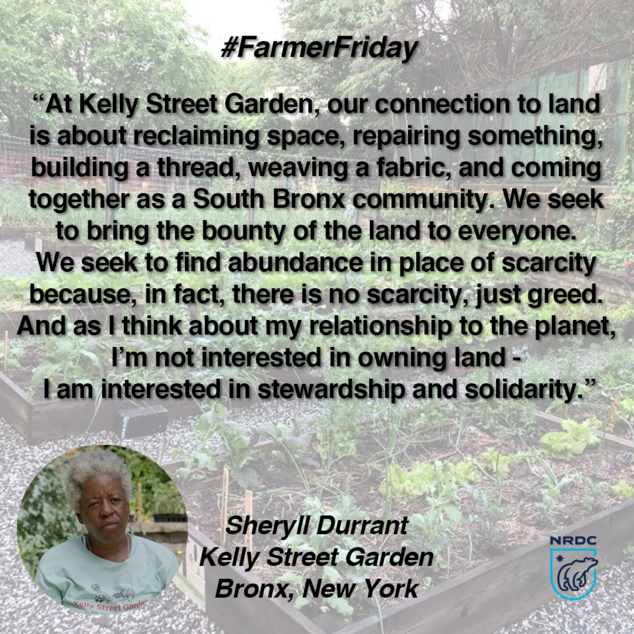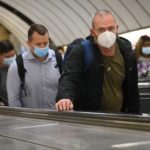Growing Community: Reimagining the Future of Food – NRDC (Natural Resources Defense Council)
The following is a guest blog by Sheryll Durrant, Resident Manager of Kelly Street Garden in the South Bronx.
Sheryll Durrant, Resident Manager of Kelly Street Garden
The COVID-19 pandemic continues to shine a spotlight on a growing hunger emergency in the United States, with long lines at food banks and families newly struggling to put food on the table a common feature of the crisis in communities across the country. But food insecurity—that is, a household’s inability to provide enough food for every person to live an active, healthy life—is not a new problem. Even before the pandemic, more than 37 million people in this country were food insecure. But too often, policymakers, elected officials, and other leaders look only to short-term solutions, and in doing so, fail to address the root causes of this long-standing problem. Instead, we need to invest in community-led efforts, including Black, Indigenous, and people of color (BIPOC)-led land stewardship models, resiliency programs, and community spaces for growing food, that offer lasting solutions and a way to rethink the food system as we know it.
Hunger has skyrocketed as a result of the COVID-19 pandemic and its associated economic crisis. Across the country, as millions face lost jobs and income, families struggle to put food on the table. This trend places a significant burden on children: food insecurity rates have quadrupled among children under age 12 as a result of the pandemic. It also has profound racial disparities: nearly four in ten Black and Latinx households with children cannot afford the food they need, and are nearly twice as likely to be food insecure as white families.
Household food insecurity is linked to worse health outcomes, especially for already vulnerable populations. In children, it is associated with delayed development, behavioral challenges, and chronic diseases like asthma and anemia, and in seniors, it is linked to an increased risk of diabetes, high blood pressure, asthma, and heart attack.
Over the course of the COVID-19 pandemic, emergency programs like food pantries, free grab-and-go meals, soup kitchens, and emerging models like community refrigerators have played a critical role in the fight against hunger in New York City and other communities around the country. Without a doubt, these programs can be life-changing for families in immediate need of a meal.
That said, when we focus only on emergency food programs or top-down charitable models, we fail to meaningfully address food insecurity or build resilience in disproportionately burdened communities ahead of the next disaster. Even today, as the pandemic rages on, we must invest in solutions that reach the root injustices of our food system, including systemic disinvestment from communities of color, that deny millions of people access to the affordable and healthy meals they want to eat. We need solutions that enable food to enrich communities, and that give folks autonomy about what they eat, how it is grown, and the benefits it generates for their larger community.
In many ways, these solutions already exist. Local efforts—led by people of color and frontline communities in New York City and across the country—offer pathways to lead us out of food insecurity and into a food system that is rooted in justice, allow us to steward the land in our care, and grow not just nourishment, but community. These community-designed and -led solutions allow us to rethink the food system as we know it for a healthier and more just future.
Kelly Street Garden, located in the Longwood/Hunts Point section of the South Bronx Kelly Street Garden
At Kelly Street Garden, we support food security and health, and cultivate community in our neighborhood in the process of growing food together. Our plot of land builds on a decades-long history of green spaces carved out in the South Bronx, situated in what has been designated the poorest Congressional district in the country, in the New York City borough that has been hit hardest by the coronavirus. Through our collective urban gardening, we are revitalizing our food system in a way that is revolutionary. We advance food system change in several key ways.
Providing Affordable, Healthy Food
First, we provide local residents with ongoing access to fresh and healthy food, free of charge. We are helping to establish a consistent, stable, and accessible source of culturally appropriate food for our community.
On top of that, we engage folks in the food system, inviting them to grow food, to cook food, and to be an active participant in the process. In doing so, we put autonomy back into the hands of our community members, allowing families to prepare their own food in the way they want it. The common perception may be that because folks are poor, we don’t know good food; but we do. Our community members hold deep memories of their families’ gardens, their grandparents’ cooking, and their favorite meals. Food pantries and soup kitchens rarely offer options that tap into those cultural histories, but our programming, in reconnecting people with growing their food and distributing produce like ginger, bitter melon, and herbs, reunites them with their family and cultural ties to food. At the core of what Kelly Street Garden does is reconnect people to good food.
Promoting Community Control and Collective Ownership
Kelly Street Garden fosters a food system that is controlled by the community itself. When people depend on food pantries and other emergency food models, they are beholden to those in power, relying on charity and philanthropy. Our garden shifts the power to the community. We belong to the community as a collective; there is no one person in the group and no outside entity who can claim absolute authority over our garden. Instead, folks work and volunteer together in a shared space that belongs to us all.
Our shared use model is distinct from traditional understandings of land possession and land ownership. We reject that capitalist model of control. Instead, we dedicate the land to the collective group, to benefit and nourish that collective.
Rebuilding Our Relationship with Land
The relationship between farming and land is not always a mutually beneficial one—just look at the soil depletion, pollution, risk to workers’ health, and other destruction caused by industrial agriculture. Kelly Street Garden reimagines the way we are accustomed to thinking about our relationship with land. Through our model, we give to the land and in return, it gives to us in the form of fresh food. Rather than using the land to exploit it, we garden to honor the land and honor our community, to nourish the land as it nourishes us. And in the process, when we garden as a community, we forge a connection between ourselves and our land; we take care of our earth, and we become stewards of it.
A New Way Forward
At Kelly Street Garden, through collective leadership, we nourish local residents and steward our shared land. These elements are all centered around community: feeding, teaching, being led by, being controlled by, and being connected to the community.
Using the space in such a community-oriented way is, perhaps, revolutionary. For centuries, land has been stolen from communities of color by forces of colonialism and racism. But on our 3000-square foot piece of land, in the heart of one of the poorest communities in the country that has experienced decades of trauma, we are working to heal those wounds. We are upending that history of stolen lands—by reworking the land for our own use and nourishment, and by rejecting the power structures that usually define land ownership. Instead, we imagine land management to be about stewarding both the land and all those who live on it. It is a more interconnected, even spiritual, understanding of a relationship with the Earth that goes beyond growing and distributing food.
Kelly Street Garden is one small urban garden, and we know that our advocacy here alone cannot save our food system. But it is one powerful example of a community-driven model that can create long-term change. We address root causes of food insecurity by feeding people, shifting the control of the food system to our community, and stewarding our shared land. Urban gardens are just one piece in a greater effort to revitalize our food ways. We also need community-designed policy solutions that, on an even larger scale, address the systemic racism underlying our food system and begin to shift ownership and control of our food system from corporations to communities.
In shifting toward a sustainable food model, we find that it’s about far more than food. We explore questions of power, ownership, spirituality, and community. Our garden, and community-led food initiatives across the country, provides an opportunity to rethink how our food system operates, and to move toward a stronger, healthier, and more sustainable future.
Sheryll Durrant is an urban farmer, educator, and food justice advocate. She has been the Resident Garden Manager at Kelly Street Garden since 2016, and is also the Food and Nutrition Coordinator for New Roots Community Farm, managed by International Rescue Committee. Her work has included developing community-based urban agriculture projects, providing expertise and technical assistance for gardens within supportive housing developments, and she currently serves as Board President for Just Food. Sheryll has led workshops and spoken on issues related to urban agriculture and food justice for many key organizations, and was part of the 2019-2020 HEAL School of Political Leadership cohort. As a former Design Trust fellow for the Farming Concrete project, she is now responsible for communications and outreach for the data collection platform that helps urban farmers and gardeners measure their impact. Prior to her work in urban agriculture, Sheryll spent over 20 years in corporate and institutional marketing.
Published at Tue, 05 Jan 2021 14:48:02 +0000






Comments
Loading…